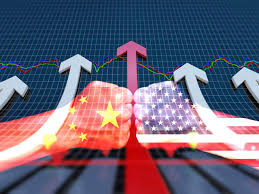
The trade war with China was escalated by the United States as it increased import tariffs to 25% on Chinese goods worth $200 billion even as last ditch efforts are being conducted to salvage the ongoing trade talks between the two countries.
However, both Chinese and US trade negotiators decided to extend the talks to a second day in Washington even as threats of retaliatory tariff was issued by China.
While increasing the tariffs, US president Donald Trump said that China had broken the deal by going back on promises that it had made during the several month long trade negotiations. Paperwork on increasing tariffs on another $325 billion in Chinese imports be was started by him on Friday, Trump also said.
China’s commerce ministry said that the US decision to increase tariffs was deeply regrettable and said that adequate measures would also be taken by it. The ministry did not however give any further details.
On Thursday, there was a 90 minute meeting held between Chinese Vice Premier Liu He, U.S. Trade Representative Robert Lighthizer and U.S. Treasury Secretary Steven Mnuchin. They are slated to meet again on Friday to extend the talks.
The Commerce Ministry said that it “hopes the United States can meet China halfway, make joint efforts, and resolve the issue through cooperation and consultation” while confirming that the trade negotiations were continuing.
The new 25% duty on more than 5,700 categories of products leaving China were imposed by the new 25% duty on more than 5,700 categories of products leaving China after 12:01 a.m. EDT (0401 GMT) on Friday after 12:01 a.m. EDT (0401 GMT) on Friday even while negotiations were in progress and no steps to reverse the increase were taken by the Trump administration.
Those cargoes shipped from China before midnight would not be levied the increased tariff rates so long as they managed to make it to the United States before June 1, said the Office of the U.S. Trade Representative in a separate statement.
“This delay might create an unofficial window during which the U.S. and China can continue to negotiate,” investment bank Goldman Sachs wrote in a note. It added that it was a “somewhat positive sign” that talks were continuing.
Notice period of less than 5 days were given to US importers of Chinese goods by the Trump administration with respect to the increase in the rate of import tariffs on $200 billion worth of Chinese goods to 25% which is now equal to the tariff rates that were imposed on the first lot of Chinese products worth a total of about $50 billion annually which primarily are machinery and technology goods.
“I think the Chinese in the end will want to keep negotiations going. The question is: where do they go for retaliation?” said James Green, a senior adviser at McLarty Associates. China is likely to increase non-tariff barriers on U.S. companies, expects Green. Such measures can include postponing regulatory approvals. This was because China is not in a position to hit the US with the same amount of imported US goods.
(Source:www.nytimes.com)
However, both Chinese and US trade negotiators decided to extend the talks to a second day in Washington even as threats of retaliatory tariff was issued by China.
While increasing the tariffs, US president Donald Trump said that China had broken the deal by going back on promises that it had made during the several month long trade negotiations. Paperwork on increasing tariffs on another $325 billion in Chinese imports be was started by him on Friday, Trump also said.
China’s commerce ministry said that the US decision to increase tariffs was deeply regrettable and said that adequate measures would also be taken by it. The ministry did not however give any further details.
On Thursday, there was a 90 minute meeting held between Chinese Vice Premier Liu He, U.S. Trade Representative Robert Lighthizer and U.S. Treasury Secretary Steven Mnuchin. They are slated to meet again on Friday to extend the talks.
The Commerce Ministry said that it “hopes the United States can meet China halfway, make joint efforts, and resolve the issue through cooperation and consultation” while confirming that the trade negotiations were continuing.
The new 25% duty on more than 5,700 categories of products leaving China were imposed by the new 25% duty on more than 5,700 categories of products leaving China after 12:01 a.m. EDT (0401 GMT) on Friday after 12:01 a.m. EDT (0401 GMT) on Friday even while negotiations were in progress and no steps to reverse the increase were taken by the Trump administration.
Those cargoes shipped from China before midnight would not be levied the increased tariff rates so long as they managed to make it to the United States before June 1, said the Office of the U.S. Trade Representative in a separate statement.
“This delay might create an unofficial window during which the U.S. and China can continue to negotiate,” investment bank Goldman Sachs wrote in a note. It added that it was a “somewhat positive sign” that talks were continuing.
Notice period of less than 5 days were given to US importers of Chinese goods by the Trump administration with respect to the increase in the rate of import tariffs on $200 billion worth of Chinese goods to 25% which is now equal to the tariff rates that were imposed on the first lot of Chinese products worth a total of about $50 billion annually which primarily are machinery and technology goods.
“I think the Chinese in the end will want to keep negotiations going. The question is: where do they go for retaliation?” said James Green, a senior adviser at McLarty Associates. China is likely to increase non-tariff barriers on U.S. companies, expects Green. Such measures can include postponing regulatory approvals. This was because China is not in a position to hit the US with the same amount of imported US goods.
(Source:www.nytimes.com)





